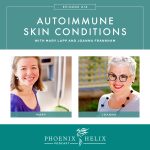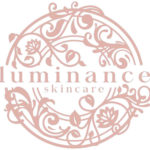Heal Skin from the Inside Out
When we think of skin, we usually think of the outside of the body, but our skin reflects what’s happening inside our body as well. It’s rare for problems to be isolated to the skin alone. Anyone with a skin-related autoimmune disease knows this. But it’s also true for any skin problem, including acne, rashes, eczema, rosacea, and others. They’re all signals from the skin that something is unbalanced within the body. We’ve talked about the importance of gut health many times on this podcast. It won’t surprise you to know that it has a major impact on skin health as well. We’re doing a deep dive into the gut-skin connection today. My guest is Dr. Shayna Peter, a holistic dermatologist who uses a root cause approach to heal skin from the inside out. She is a Doctor of Naturopathic Medicine, specializing in dermatology and functional medicine. She also has a Bachelor’s degree in nutrition, making her the perfect guest for this topic. And she’s the author of the book, It’s Not Just Acne.
Listen to the Show
- Subscribe to my podcast through your favorite podcast app: iTunes, Stitcher, Google, TuneIn, Spotify, Amazon, etc.
- You can also listen to the episode right here through the player below, and if you subscribe to my newsletter you’ll get notified of future episodes.
Podcast: Play in new window | Download
Show Notes
- Intro (0:00)
- The 200th Episode!
- When I started this podcast back in 2014, I didn’t know if I’d end up with any listeners at all. 200 episodes and 2 million downloads later, I want to thank each and every one of you. This podcast couldn’t happen without you. I’m so grateful you choose to spend your valuable time with me.
- Thank You To Our Podcast Sponsor – Luminance Skincare (2:42)
- Today we’re talking about how the health of our interior body impacts the health of our skin, but that connection goes both ways. Our skin absorbs what we put on it, and if our skincare products are full of chemicals, they enter our bloodstream and can harm our health. Luminance has the cleanest skincare anywhere. Today, I want to highlight their bestselling face care trio. It includes their delicate cleanser, rosewater toner, and deep hydration moisturizer. It’s available in sample sizes making it easy to try, and of course it’s available in full bottle sizes as well.
- Whereas conventional skincare products are full of chemicals that can hurt our bodies, Luminance is made from ingredients that nourish. It’s the cleanest skincare anywhere. Their products are natural, organic, wildcrafted, non-GMO, and gluten-free (and they’re even made in a dedicated gluten-free facility). They’re also handmade in small batches within the United States.
- They have a complete face and body care line, including cleansers, toners, moisturizers, masks, acne serum, sunscreen, haircare, and more.
- Place an order here, and use the code HELIX for 10% off your first order.
- Meet Dr. Shayna Peter (4:02)
- Dr. Shayna Peter is a holistic dermatologist who uses a root cause approach to heal skin from the inside out. She is a Doctor of Naturopathic Medicine, specializing in dermatology and functional medicine. She also has a Bachelor’s degree in nutrition and is the author of the book, It’s Not Just Acne.
- She actually knew as a child that she wanted to be a dermatologist and assumed she would take a conventional medical path. But when she was in medical school, she developed severe acne for the first time in her life, and none of the conventional treatments helped. They either failed altogether or only worked for a short period of time. Many of them also irritated her skin.
- Simultaneously, she saw patients with a wide variety of skin problems who were looking for alternatives to conventional treatment. She knew there had to be a better way to practice medicine, and when she went searching for answers, she discovered functional medicine.
- Important Roles and Functions of Our Skin (7:13)
- It’s easy to take our skin for granted if we don’t have a skin problem. Many of us don’t realize all the functions it performs.
- Our skin is actually our largest organ.
- It’s a physical barrier which is our body’s first line of defense against the outside world. It protects us from weather, UV radiation, germs, and toxins.
- It helps regulate body temperature.
- Through sensation, it allows us to detect pain, pressure, and temperature.
- When exposed to sunlight, it creates vitamin D.
- It also an organ of detoxification, and when our body is overloaded with toxins, that can manifest in skin symptoms.
- Our skin is often a messenger, signaling problems in our outside environment, but also imbalances within our body.
- Resource: How does skin work?
- Our Skin as a Messenger (8:57)
- While no wants to have skin issues, they are visible signals from our body that are difficult to ignore. Instead of seeing that as a negative, if we pay attention to those signals, it’s an opportunity to revitalize our health on a deep level. That’s the mindset Dr. Shayna encourages in her patients.
- Gut Problems That Can Cause Skin Problems (10:36)
- Leaky Gut – When the barrier that lines our intestines becomes compromised, that leads to a whole host of problems, including increased inflammation that can manifest as skin issues. Leaky gut also increases autoimmune activity, so it has an especially large influence on autoimmune skin diseases.
- Poor Nutrient Absorption – Nutrition is the foundation of health, including the health of our skin. In fact, certain nutrient deficiencies are correlated to different skin conditions. It’s important to eat a nutrient-dense diet, but digestive issues (like not having enough digestive enzymes) can cause nutrient deficiencies by interfering with our ability to absorb nutrients from our food. It’s also important to understand that our skin receives nutrition last. Nutrients are circulated elsewhere in the body first.
- Dysbiosis – This is the term for an imbalance of the gut microbiome that’s significant enough to impact our health. It can be an undergrowth of beneficial bacteria, a lack of bacterial diversity, a pathogenic infection, or simply opportunistic bacteria that are healthy in small numbers but cause health issues when they become too numerous.
- Food Sensitivities – Food reactions can definitely trigger skin conditions. However, they’re a symptom of a deeper problem with our gut health and our immune system, so Dr. Shayna works to improve tolerance with her patients.
- 70% of our immune cells live in our gut which is another reason that gut health impacts autoimmune health so strongly, including autoimmune skin conditions.
- Resource: The Gut-Skin Axis.
- Top Food Triggers of Skin Symptoms (15:27)
- Food sensitivities are unique to each person, which is why elimination diets like the AIP are so helpful in identifying them. However, there are some that Dr. Shayna sees frequently in her clinical practice.
- Gluten – It drives inflammation and can also cause leaky gut in anyone, even if they don’t have celiac disease or gluten sensitivity. In addition, many gluten-containing products are refined and can spike blood sugar, which also causes inflammation.
- Dairy – Lactose is the sugar in dairy and can spike blood sugar, and some people are lactose intolerant as well. Casein is the protein in dairy which can cause food reactions in some people. And even organic dairy contains hormones, because dairy is intended as food for baby animals and naturally contains hormones to help them grow. Hormone imbalances are one of the root causes of skin problems. In addition, the protein in dairy (casein) has been shown to stimulate growth hormones in humans as well.
- Sugar – It directly impacts blood sugar, often causing the highs and lows that increase inflammation. While natural sugars like honey and maple syrup are healthier than refined sugars, they can still spike blood sugar and cause inflammation if we eat too much.
- Alcohol – It increases inflammation, causes leaky gut, shifts the microbiome in an unhealthy direction, burdens the body’s detoxification systems, disrupts blood sugar balance, and can cause nutrient deficiencies as well. Dr. Shayna recommends limiting or eliminating alcohol.
- Refined Vegetable Oils – The industrial vegetable and seed oils so common in the American diet can throw off the omega 3:6 balance in our bodies, increasing inflammation.
- Refined Carbohydrates – Even if they’re gluten-free, they still spike blood sugar and can increase inflammation. They should be limited on any healing diet.
- Thank You to Our Podcast Sponsor – Functional Nutrition Alliance (21:42)
- Full Body Systems is their internationally acclaimed, 10-month online functional nutrition immersion training program.
- It’s designed by world-renowned educator, Andrea Nakayama. Many of you know her as one of my most popular podcast guests. Her unique way of working with patients often leads to results where other practitioners hit dead ends. This program teaches you to do the same.
- If you’re already trained as a health coach, nutritionist, or medical practitioner and want to more effectively help your clients break through healing plateaus, this class is for you!
- And if you’re an aspiring practitioner just getting started, this might be the only training you need.
- You’ll gain detailed knowledge of all the systems in the body, how they interact, how problems develop, and how to personalize diet and lifestyle recommendations for each unique client.
- Enrollment is currently open. To learn more, visit FxNutrition.com/Eileen.
- Top Nutrients for Skin Health (23:08)
- Our body, including our skin, needs a wide variety of nutrients. So, a nutrient-dense and nutrient-diverse diet is necessary for skin health, but Dr. Shayna did share a few nutrients that are especially beneficial to the skin.
- Omega 3 Fatty Acids – They lubricate the skin, benefit the microbiome, support the intestinal barrier, and calm inflammation. Wild-caught fatty fish is the food source of this nutrient.
- Vitamin D – Helps regulate the immune system, reduces inflammation, and also benefits the microbiome and intestinal barrier. If you can get vitamin D through sunshine, that’s how the body is designed to create and absorb vitamin D. However, if you have dark skin or photosensitivity, this may not be possible. Then, a quality supplement is a good option, but vitamin D metabolism is complicated. Listen to this podcast for detailed recommendations: Ep. 179 – Vitamin D and Autoimmune Disease.
- Vitamin A – Is frequently seen in hair/skin/nail vitamin formulas, as well as medical treatments for acne, psoriasis, and other skin conditions due to its multiple benefits for the skin. It also supports the intestinal barrier. Vitamin A comes in both active and inactive forms. Some food sources contain the active form (like liver and pastured egg yolks) while other foods contain the inactive form (like carrots and sweet potatoes). Our body needs to convert the inactive form and much of the nutrient is lost in conversion. So, the active form is what Dr. Shayna recommends. This is one of the reasons organ meats come so highly recommended on a healing diet, and why egg yolks are the one of the first foods to try reintroducing on the paleo autoimmune protocol.
- Beneficial Skin Supplements (31:33)
- In addition to the nutrients mentioned above, some additional supplements that support skin and gut health are:
- Turmeric – It has potent anti-inflammatory properties and has also been shown to help with hormone balance.
- Green Tea Extract – It has anti-inflammatory properties and also serves as a prebiotic, helping to feed beneficial bacteria in our microbiome.
- Collagen – While our body naturally creates collagen, levels decrease as we age. It’s the building block for much of our anatomy, including skin, nails, hair, joints, and the intestinal lining. Collagen supplementation supports skin health, gut health, and body health overall. (Resource: What’s the Difference Between Gelatin and Collagen?)
- Lifestyle Factors in Skin Health (34:27)
- Sleep, movement, and stress management are considered determinants of health in naturopathic medicine. When these pillars of health are disrupted, it can impact skin health as well.
- Sleep is a critically important repair process in our body, and it’s said we should spend 1/3 of our lives sleeping (approx. 8 hours a day). The hours between 10pm and midnight may be especially helpful in healing. Prioritizing sleep is necessary for maintaining health, but it’s even more essential for people with autoimmune disease. (Resource: Ep. 94 Troubleshooting Sleep.)
- Stress can cause skin issues through the gut-brain-skin axis, and it’s very common to have skin manifestations of stress, whether autoimmune or otherwise. Stress management is always part of Dr. Shayna’s treatment plans for her patients. She encourages them to think of stress management as self-care. What brings you joy? What activities do you find relaxing? Make a list, and do one of those every day. She also notes that a skincare routine can be relaxing, enjoyable self-care as well. (Resources: Ep. 148 – Self-Soothing vs. Self-Care and Eileen’s Book: Healing Mindset.)
- Exercise supports a healthy microbiome, influencing skin health through the gut-skin connection. It also supports blood sugar balance which helps reduce inflammation. And exercise supports both nourishment and detoxification of the skin through increased blood flow, lymphatic flow, and sweating. People with autoimmune disease often struggle with exercise intolerance. If that’s you, listen to Episode 114 of this podcast where we share advice for overcoming it and being able to exercise again.
- The Skin Microbiome (43:16)
- The gut microbiome is the “famous” one, but there also microbiomes elsewhere in the body including our skin. It contains trillions of microbes and 1,000 different species.
- The skin microbiome enhances the skin barrier, provides an extra layer of protection against skin infections, and also helps regulate inflammation in the skin.
- Outro (44:56)
- You can connect with Dr. Shayna through her website: Well Ahead Chicago. She is accepting new patients in-person in Chicago, and she also works with people around the world via telehealth. She’s also the author of the book, It’s Not Just Acne. And she shares education and inspiration on Instagram.
- Eileen (your podcast host) is the author of multiple books, written to help people thrive with autoimmune disease. Learn more on the Books Page.
- If you like this podcast, follow or subscribe through your favorite podcast app. You can also subscribe to Eileen’s biweekly newsletter.
- Check out the entire archive of podcast episodes.
You May Also Be Interested In
Spreading the Word
If you like the podcast, please leave a positive review in iTunes. It would mean the world to me, and also helps others find the podcast. Here are some quick instructions using your iPhone:
- If you are already subscribed to my podcast: (1) Click the purple podcast icon. (2) At the bottom of the screen, click Library. (3) At the top of the screen, click Shows. (4) Click the Phoenix Helix podcast image. (5) Scroll down the page, and you’ll see Ratings and Reviews. Scroll down a little bit more and click on Write a Review. This will bring up the review screen. Tap 5 stars (if you love the podcast), and then click in the title box, and it will bring up the keyboard. Enter a title and short review. (6) Click Send in the upper right corner. (7) Thank you! Positive reviews give the podcast a higher search ranking in iTunes, helping people find it and letting them know it’s a quality podcast and worth their time to listen.
- If you haven’t subscribed to my podcast: (1) Click the purple podcast icon. (2) In the lower right corner, click the magnifying class. (3) Type Phoenix Helix in the search box. (4) Click the podcast cover in the Show list. (5) If you’d like to subscribe, click the + sign at the top of the screen. (6) To write a review, scroll down the page, and you’ll see Ratings and Reviews. Scroll down a little bit more and click on Write a Review. This will bring up the review screen. Tap 5 stars (if you love the podcast), and then click in the title box, and it will bring up the keyboard. Enter a title and short review. (7) Click Send in the upper right corner. (8) Thank you! Positive reviews give the podcast a higher search ranking in iTunes, helping people find it and letting them know it’s a quality podcast and worth their time to listen.








